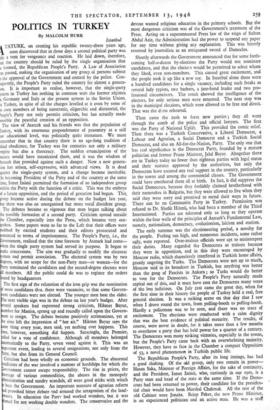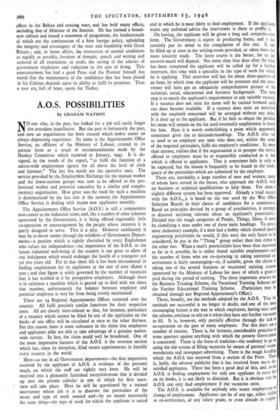POLITICS IN TURKEY
By MALCOLM -BURR Istanbul TATURK, on creating his republic twenty-three years ago, soon discovered that in those days a second political party was illy a vent for vengeance and reaction. He laid down, therefore, -tat the country *should be ruled by the single organisation that e formed, the Republican People's Party. A Law of Association 'as passed, making the organisation of any group of .persons subject a the approval of the Government and control by the police. Con- equently, the People's Party ruled the country for almost a genera- on. It is important to realise, however, that the single-party ystem in Turkey has nothing in common with the former regimes a Germany and Italy or the present system in the Soviet Union. n Turkey, in spite of all the charges levelled at it even by some of is own members of being autocratic, oligarchic and dictatorial, the kople's. Party not only permits criticism, but has actually made Kissible the peaceful creation of an opposition.
The view of Ataturk and his friends was that the population of Purkey, with its enormous preponderance of peasantry at a still ow educational level, was politically quite immature. We must .emember that in that country there is an age-long tradition of Aind obedience, for Turkey was for centuries not only a military anpire but also a theocracy. The sudden emancipation of the nasses would have intoxicated them; and it was the wisdom of .ktaturk that provided against such a danger. Now a new genera- ion has arisen, self-expressive, with advanced views. It is dead tgainst the single-party system, and a change became inevitable. Jrt becoming President of the Party and of the country at the same time, Ismet Intinia permitted the formation of an independent group within the Party with the function of a critic. This was the embryo of a future opposition, and the period of gestation had begun. This group became active during the debate. on the budget last year, but there was also an unorganised but more vocal dissident group. The debates became so .vigorous that men began talking about the possible formation of a second party. Criticism spread outside the Chamber, especially into the Press, which became very out- spoken. Some papers went so far to the Left that their offices were robbed by excited students and their editors prosecuted and entenced to terms of imprisonment. The People's Party, i.e., the overnment, realised that the time foreseen by Ataturk had come— 'hen the single party system had served its purpose. It began to ke concessions. The aim was gradually to modify the electoral ystem and permit association. The electoral system was by two egrees, with no scope for the non-Party man—or woman—for the 'arty nominated the candidates and the second-degree electors were II members. 'All the public could do was to register the orders ssued by headquarters.
The first sign of the relaxation of the iron grip was the nomination
f more candidates thar. there were vacancies, so that some Govern- em candidates were not elected. The younger men beat the older. he next visible sign was in the debate on last year's budget. After Vera! speakers had expressed strong criticism, Hikmet Bayur, ember for Manisa, sprang up and roundly called upon the Govern- ent to resign. The debate became positively acrimonious, yet at e time left the impression of " hot air." Hikmet Bayur• says the me thing every year, men said, yet nothing ever happens. This me, however, something did happen. Saracioglu, the Premier, ailed for a vote of confidence. Although all members belonged utomatically to the Party, seven voted against it. This was an portant event, leading to several resignations, not only from the arty, but also from its General Council.
Criticism had been wholly on economic grounds. The abnormal onditions of the war involved a number of hardships for which the vernment cannot escape responsibility. The rise in prices, the hortage of various commodities, the abuses in the monopoly ministration and sundry scandals, all were good sticks with which beat the Government. An important measure of agrarian reform • d provoked bitter debate cind aroused the antagonism of the land- ners. In education the Party had worked wonders, but it was lamed for not working double wonders. The conservative and the
devout wanted religious education in the primary schools. But the most dangerous criticism was of the Government's treatment of the Press. Acting on a superannuated Press law of the reign of Sultan Abdul Aziz, the Administration had the power to suspend any paper for any time without giving any explanation. This was bitterly resented by journalists as an antiquated sword of Damocles.
Shortly afterwards the Government announced that for some forth- coming half-a-dozen by-elections the Party would not nominate candidates, and that the electors would be permitted to select whom they liked, even non-members. This caused great excitement, and the people took it up like a new toy. In Istanbul alone there were a hundred candidates for a single vacancy, including such freaks as several lady typists, two barbers, a jazz-band leader and two pro- fessional circumcisers. The result showed the intelligence of the electors, for only serious men were returned. The next step was in the municipal elections, which were allowed to be free and direct. That was the dress rehearsal.
Then came the rush to form new parties ; they all went through the comb of the police and official lawyers. The first was the Party of National Uplift. This provided the comic relief. Then there was a Turkish Conservative, a Liberal Democrat, a Labour and Agrarian, a Social Democrat and a Turkish Social Democrat, and also an All-for-the-Nation, Party. The only one that has teal significance is the Democrat Party, founded by a mature politician and former Prune Minister, Jelal Bayar. Altogether there are in Turkey today no fewer than eighteen parties with legal status and their statutes approved by the authorities, but only the Democrats have secured any real support in the country, particularly in the towns and among the commercial classes. The Government could have smothered them all at birth. In fact, it did suppress the Social Democrats, because they foolishly claimed brotherhood with their namesakes in Bulgaria, but they were allowed to live when they said they were sorry and promised to mend their ways in future. There can be no Communist Party in Turkey. Permission was refused to Dr. Shefik Hiisnii, who had been a member of the Third International. Parties are tolerated only so long as they operate within the four walls of the principles of Ataturk's Fundamental Law, namely, nationalism, democracy, evolutionism, laicism and etatism.
The early summer was the electioneering period, a novelty for the people. Feeling ran high, and numerous incidents, some rather ugly, were reported. Over-zealous officials were apt to misinterpret their duties. Many regarded the Democrats as traitors because they were in opposition, and in this they were encouraged by Moscow radio, which shamelessly interfered in Turkish home affairs, greatly angering the Turks. The Democrats were not up to much, Moscow said in its broadcast in Turkish, but anything was better than the gang of Fascists in Ankara ; so Turks would do better to vote for the Democrats. The People's Party naturally made capital out of this, and it must have cost the Democrats many votes of the less judicious. On July 21st came the great day, when for the first time in their history the people of Turkey held a real, free general election. It was a striking scene on that day that I saw when I drove round the town, from polling-booth to polling-booth. Hardly a policeman was to be seen, and there was no trace of excitement. The elections were conducted with a calm dignity that was the best evidence of political maturity. The results, of course, were never in doubt, for it takes more than a few months to overthrow a party that has held power for a quarter of a century. The Democrats won many striking victories, especially in the towns, but the People's Party came back with an overwhelming majority. However, they have to face in the Chamber a compact Opposition of 53, a novel phenomenon in Turkish public life.
The Republican People's Party, after its long innings, has had a good shaking. Of the old group, only two remain in power- Hasan Saka, Minister of Foreign Affairs, for the sake of continuity, and the President, Ismet InOnii, who, curiously in our eyes, is a Party man and head of the state at the same time. If the Demo- crats had been returned to power, their candidate for the presiden- tial chair would have been Marshal Chakmak. All the rest of the old Cabinet were Jonahs. Rejep Peker, the new Prime Minister, is an experienced politician and an active man. He was a staff officer in the Balkan and ensuing wars, and has held many offices, including that of Minister of the Interior. He has formed a brand- new cabinet and issued a statement of programme, the fundamentals of which are the continuation of a firm foreign policy, upholding the integrity and sovereignty of the state and friendship with Great Britain ; and, in home affairs, the restoration of normal conditions as rapidly as possible, freedom of thought, speech and writing and removal of all restrictions in trade, the raising of the salaries of government employees and reduction in the cost of living. This announcement has had a good Press and the Premier himself has stated that the maintenance of the confidence that has been placed in his Cabinet depends upon its ability to fulfil its promises. Thus a new era, full of hope, opens for Turkey.



























 Previous page
Previous page